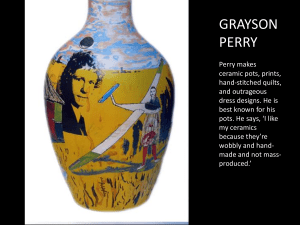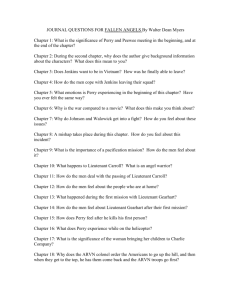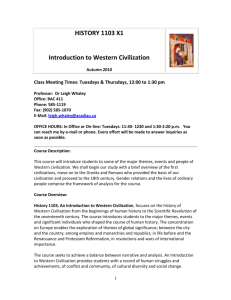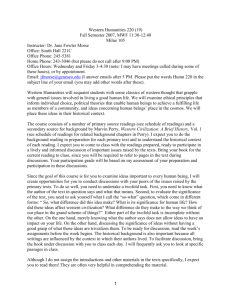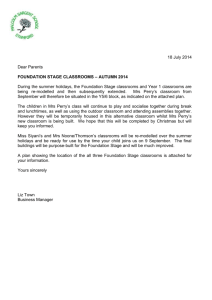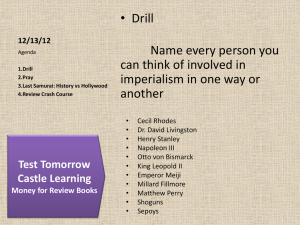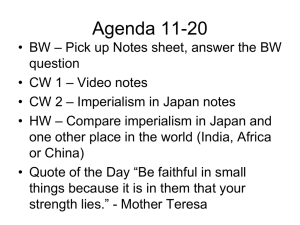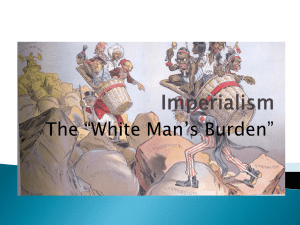Western Humanities 221 (09)
advertisement
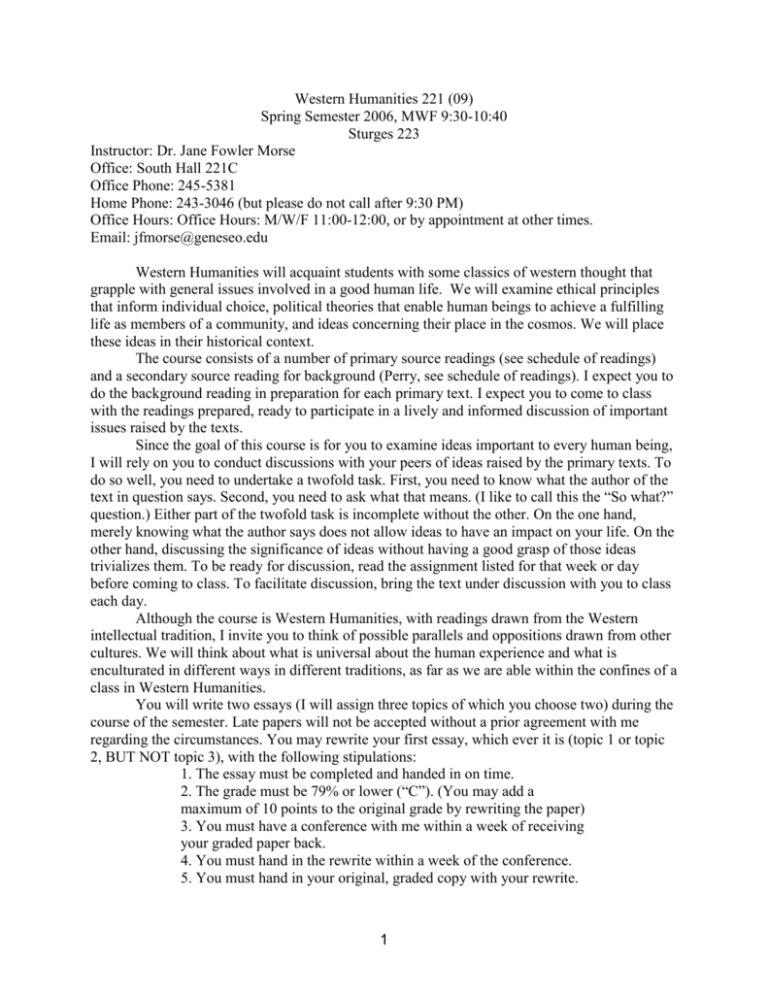
Western Humanities 221 (09) Spring Semester 2006, MWF 9:30-10:40 Sturges 223 Instructor: Dr. Jane Fowler Morse Office: South Hall 221C Office Phone: 245-5381 Home Phone: 243-3046 (but please do not call after 9:30 PM) Office Hours: Office Hours: M/W/F 11:00-12:00, or by appointment at other times. Email: jfmorse@geneseo.edu Western Humanities will acquaint students with some classics of western thought that grapple with general issues involved in a good human life. We will examine ethical principles that inform individual choice, political theories that enable human beings to achieve a fulfilling life as members of a community, and ideas concerning their place in the cosmos. We will place these ideas in their historical context. The course consists of a number of primary source readings (see schedule of readings) and a secondary source reading for background (Perry, see schedule of readings). I expect you to do the background reading in preparation for each primary text. I expect you to come to class with the readings prepared, ready to participate in a lively and informed discussion of important issues raised by the texts. Since the goal of this course is for you to examine ideas important to every human being, I will rely on you to conduct discussions with your peers of ideas raised by the primary texts. To do so well, you need to undertake a twofold task. First, you need to know what the author of the text in question says. Second, you need to ask what that means. (I like to call this the “So what?” question.) Either part of the twofold task is incomplete without the other. On the one hand, merely knowing what the author says does not allow ideas to have an impact on your life. On the other hand, discussing the significance of ideas without having a good grasp of those ideas trivializes them. To be ready for discussion, read the assignment listed for that week or day before coming to class. To facilitate discussion, bring the text under discussion with you to class each day. Although the course is Western Humanities, with readings drawn from the Western intellectual tradition, I invite you to think of possible parallels and oppositions drawn from other cultures. We will think about what is universal about the human experience and what is enculturated in different ways in different traditions, as far as we are able within the confines of a class in Western Humanities. You will write two essays (I will assign three topics of which you choose two) during the course of the semester. Late papers will not be accepted without a prior agreement with me regarding the circumstances. You may rewrite your first essay, which ever it is (topic 1 or topic 2, BUT NOT topic 3), with the following stipulations: 1. The essay must be completed and handed in on time. 2. The grade must be 79% or lower (“C”). (You may add a maximum of 10 points to the original grade by rewriting the paper) 3. You must have a conference with me within a week of receiving your graded paper back. 4. You must hand in the rewrite within a week of the conference. 5. You must hand in your original, graded copy with your rewrite. 1 In order to accommodate the needs of the class, we may deviate from the announced syllabus from time to time. Your class attendance is important: first, to absorb and discuss the materials; second, to be sure you know the current topics and assignments; and third, to do homework or group work assignments from time to time, which count towards class participation on your grade. During the course of the semester, I may give unannounced quizzes that will count towards your participation grade (no make-ups). Surveys on the Perry readings will also count towards your participation grade. You will be required to do seven. These will be closed on Friday of the week they are due. There will be two hour-examinations and a final examination; all three will be primarily essay examinations. The final examination will be cumulative. Please bring two blue books to each hour examination and three to the final. College Statement on Disabilities: SUNY Geneseo will make reasonable accommodations for persons with physical, emotional, or learning disabilities. Students should consult with the Director in the Office of Disability Services (Tabitha Buggie-Hunt, 105D Erwin, tbuggieh@geneseo.edu.) and their individual faculty regarding any needed accommodations as early in the semester as possible. College Learning Outcomes for Humanities: Students will: • Demonstrate knowledge of the contributions of significant Western thinkers to ongoing intellectual debate about moral, social, and political alternatives; • Demonstrate knowledge of the major trends and movements that have shaped and responded to this debate: e.g., monotheism, humanism, etc. • Demonstrate the ability to think critically about moral, social, and political arguments in the Western intellectual tradition, evaluating the logic of these arguments and relating them to the historical and cultural context • Consider moral, social, and political issues from an interdisciplinary perspective. Required Texts: (Note: Please purchase the edition I have chosen) Primary Texts: Galileo, Letter to the Grand Duchess Christina (online at http://www.fordham.edu/halsall/mod/galileo-tuscany.html) (Letter written in 1615) Rene Descartes. Discourse on Method. Translated by Donald Cress. Hackett Publishing Company: Indianapolis/Cambridge, 1980. (Text first published in 1637.) John Locke. Second Treatise of Government. Edited by C.B. McPherson. Hackett Publishing Company: Indianapolis/Cambridge, 1980. (Text first published in 1690.) Mary Wollstonecraft. A Vindication of the Rights of Woman. Edited by Miriam Brody. Penguin Books: London, 1975. (Text first published in 1792.) Immanual Kant. Perpetual Peace and Other Essays. Hackett Publishing Company: Indianapolis, 1983. (Text first published in1795) Charlotte Bronte. Jane Eyre, edited by Richard Nemesvari. Broadview Literary Texts: Peterborough, Ontario, Canada,1999. (Text first published in 1847.) Karl Marx. The Communist Manifesto. (Text first published in1848) 2 The Declaration of Sentiments, Seneca Falls Women’s Rights Convention, 1848 (online at http://www.ku.edu/carrie/docs/texts/seneca.htm) John Stuart Mill. On Liberty. Edited by Elizabeth Rapaport. Hackett Publishing Company: Indianapolis/Cambridge, 1978. (First published in 1859.) American History Documents. (xeroxes available from Sundance Books.) Sigmund Freud. Civilization and Its Discontents. Introduced by Peter Gay, translated and edited by James Strachey. New York/London: W.W. Norton and Company, 1961. (First published in 1930.) Charlotte Perkins Gilman. “The Yellow Wallpaper.” Dover Thrift Edition (any edition will do.) (First published in 1892.) Elie Weisel. Night. Bantam Books: Toronto/New York, 1982. (First published in 1960.) Jean Rhys, The Wide Sargasso Sea. WW Norton & Co., 1982 (First published in1966.) Martin Luther King, Jr. Letter from A Birmingham Jail (online at http://almaz.com/nobel/peace/MLK-jail.html)(Speech given in 1963.) The United Nations Universal Declaration of Human Rights (online at http://www.un.org/Overview/rights.html)(1945) Secondary Text: Perry, Marvin. Western Civilization: A Brief History. Volume II. Fifth Edition. Houghton Mifflin: Boston and New York, 2005. TABLE OF READINGS AND ASSIGNMENTS: Week: Author: Assignments and Exams (underlined) Week One 1/18-20 Galileo, Letter to the Grand Duchess Christina (online at http://www.fordham.edu/halsall/mod/galileo-tuscany.html) Descartes, Discourse on Method Perry Chapter 9 Week Two Descartes 1/23-27 Locke, Second Treatise on Government Perry Chapter 10 Week Three Locke 1/30-2/3 US Declaration (AHD), US Constitution (AHD), Federalist and Anti-Federalist (AHD), other documents Iroquois Constitution (AHD) Perry Chapter 11 Week Four Wollstonecraft 2/6-10 Perry Chapter 12 Week Five Kant 2/13-17 Perry Chapter 13 Paper Topic #1 due F 2/17 (covers readings weeks 1-4) 3 Pages or Sections (TBA — as we go along you may write them in): entire Chapter One, Two Remainder Week Six 2/20-24 Kant First Hour Exam 2/22 (Covers Through Kant) Perry Chapter 14 Bronte, Jane Eyre Week Seven Bronte 2/27-3/3 Week Eight Mill, On Liberty 3/6-10 Martineau (AHD) Perry Chapter 15 Spring Break, March 13-17 No Classes Week Nine Mill (remainder) 3/20-24 Marx, Communist Manifesto; Declaration of Sentiments, Seneca Falls, 1848 (online at http://www.ku.edu/carrie/docs/texts/seneca.htm Perry Chapter 16 Week Ten Gillman, The Yellow Wallpaper 3/27-3/31 Freud, Civilization and its Discontents Paper Topic #2 due F 3/31 (covers readings weeks 5-9) Perry Chapter 17 Week Freud Eleven Second Hour Exam 4/7 (covers readings weeks 6 (Kant)-11 4/3-7 (Freud) Perry Chapter 18 Week Douglas (AHD) Twelve Weisel 4/10-14 Perry Chapters19 Week Rhys, The Wide Sargasso Sea Thirteen Perry Chapters 20 4/17-21 Week Perry Chapter 21 Fourteen Rhys 4/24-28 King Letter from a Birmingham Jail (online at http://almaz.com/nobel/peace/MLK-jail.html) Paper Topic #3 due F 4/28 (covers readings weeks 10-14) Week UN Declaration of Universal Human Rights, 1948 (online at Fifteen http://www.un.org/Overview/rights.html) 5/1 last class FINAL EXAM: Wednesday, May 10, 8-11 AM (Bring Three Blue Books) Grading: Graded components of this course include two essays, two hour-exams, class participation (based on being there, speaking in class, completing surveys, and pop quizzes), and a final examination, weighted in the following percentages: 4 Two essays Two hour exams Participation and Surveys Final examination 30% 30% 10% 30% Scale of final letter grades: A AB+ B BC+ C CD E 94-100% 90-93% 87-89% 84-86% 80-83% 77-79% 74-76% 70-73% 66-69% 65% and below. I calculate all grades by a spreadsheet, rounding up from .5 and down from .4 on each assignment. To calculate final grades, I weight and add percentages and assign letter grades according to the chart above. Please consult me immediately after receiving each graded assignment if you wish to discuss the grade. I do not write many comments on finals, nor do I return them, since my questions are very general and something like them must eventually appear again sometime. You are cordially invited to stop by my office to see your final during the early weeks of the semester following the semester you are enrolled. Please note that your participation counts for a hefty 10%. You will need to read the assignments before coming to class, attend class, and speak up in class in order to earn these points. Writers of plagiarized papers will fail the assignment and/or the course at my discretion. All plagiarized papers will be reported to the Dean of Students. Be sure to document all sources carefully. (The definition of plagiarism and a description of the procedure to be followed in cases of plagiarism are to be found in the Undergraduate Bulletin.) I do follow up on suspected cases of plagiarism. 5

